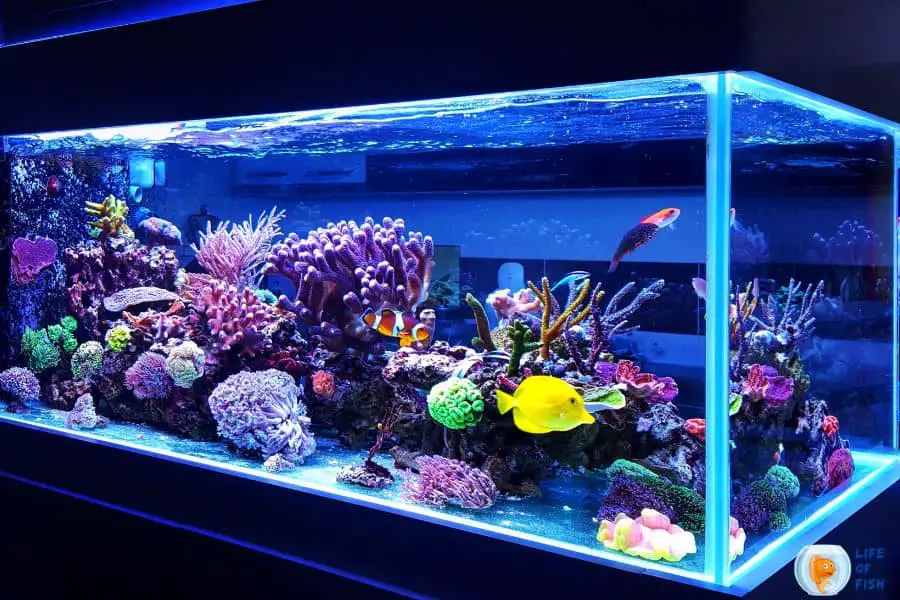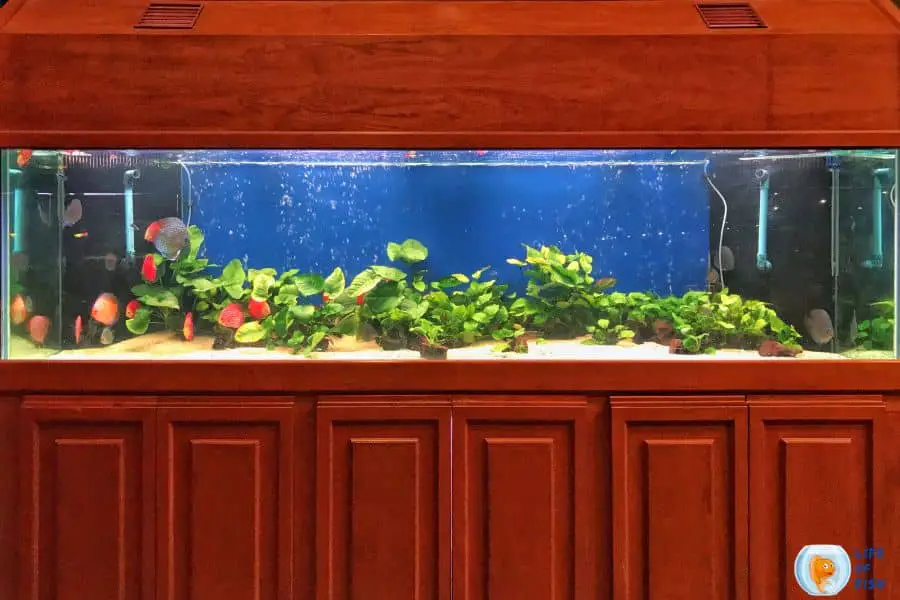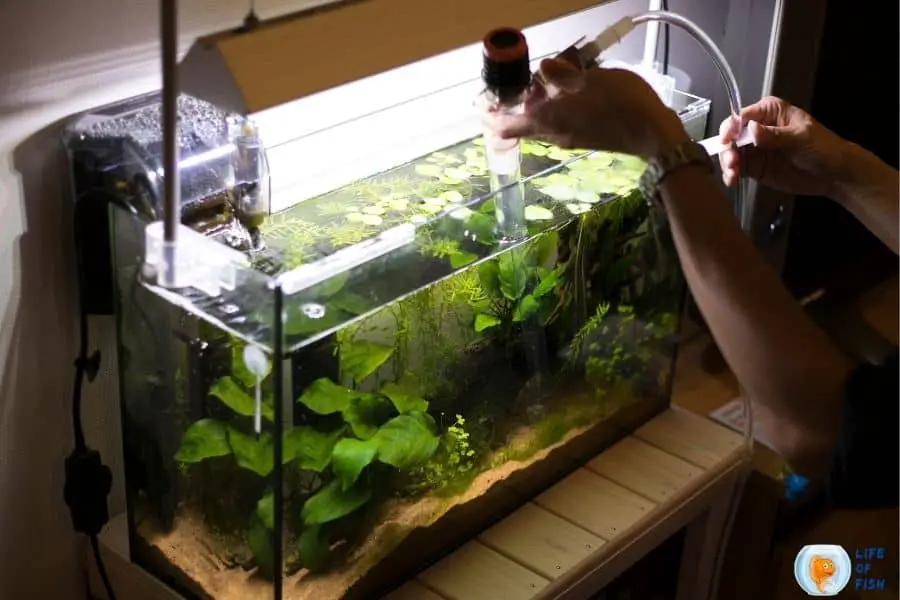How far from the wall should the fish tank be? There is no simple answer to this question as you have to consider the safety of your fish as well as your wall, room, and home.

Having a fish tank at your home is a great way to relax and enjoy the beauty of nature. Fish keeping is not just buying a fish tank and keeping it anywhere you want. There are things to consider before deciding on a place for your fish tank.
This article will guide you through different aspects that you need to consider while deciding on the placement of your fish tank.
Where should a fish tank be placed in a room?
Jump To
- 1 Where should a fish tank be placed in a room?
- 2 Is it OK to put a fish tank near a window?
- 3 Can a fish tank be placed on an outside wall?
- 4 Is it OK to have a fish tank in your bedroom?
- 5 How far from the wall should the fish tank be?
- 6 Can fish tanks cause mold?
- 7 How to prevent mold growth in your walls?
- 8 Related questions
- 9 Conclusion
In general, fish need a quiet and peaceful environment. So, the first thing you need to consider while placing your fish tank is the activity level in that room.
If the room is too active with people coming and going, placing your fish tank, there might not be a good idea.
Fishes are also very sensitive to changes in their environment. So, if the room is too noisy or has a lot of vibrations, it can stress out your fish.
Another important thing to consider is the light in the room. Too much or too little light can be harmful to your fish. For example, direct sunlight can cause algae blooms in your fish tank.
You also need to consider the temperature of the room. Most fishes thrive in a tropical environment with a water temperature of around 25 degrees Celsius.
So, when deciding on the placement of your fish tank, make sure to choose a room that is peaceful, has moderate light, and is at a comfortable temperature.
Is it OK to put a fish tank near a window?
We advise against putting your fish tank near a window for two main reasons.
First, windows are usually drafty, and the fluctuating temperatures can be harmful to your fish. Second, the direct sunlight coming through the window can cause algae blooms in your fish tank.
If you decide to put your fish tank near a window, use a light-blocking curtain to filter out the sunlight.
Further, use an aquarium heater to maintain a stable water temperature.
Can a fish tank be placed on an outside wall?
No, we do not recommend placing your fish tank on an outside wall.
The reason is that the temperature of an outside wall can be very different from the rest of the room. For example, in the winter, the temperature of an outside wall can be colder than the inside. This can be harmful to your fish.
In addition, placing your fish tank on an outside wall can make it more difficult to control the light and temperature in your fish tank.
Is it OK to have a fish tank in your bedroom?
Yes, you can have a fish tank in your bedroom as long as you take the necessary precautions.
- Make sure the room is big enough to accommodate the fish tank and all the necessary equipment.
- Consider the noise level in the room. Some people find the sound of running water relaxing, but others might find it disruptive.
- Consider the light in the room. Too much or too little light can be harmful to your fish.
- Consider the temperature of the room. Most fishes thrive in a tropical environment with a water temperature of around 25 degrees Celsius.
So, as long as you take the necessary precautions, having a fish tank in your bedroom is fine.

How far from the wall should the fish tank be?
There are several factors to consider when deciding how far from the wall to place your fish tank.
Size of the room
If your room is small, you might want to place your fish tank closer to the wall to save space.
Some hobbyists keep their fish tanks on the wall without any space between the wall and the tank.
However, this is not always a good idea, as the tank can cause mold on your wall if you keep your fish tank too close to the wall. We’ll discuss how to prevent mold growth in your wall later in this article.
Size of the fish tank
The space won’t be a problem if you have a small fish tank. You can place it wherever you want if the place is quiet and peaceful.
Just be sure not to place your fish tank near the window, door, or too busy areas.
If your fish tank is quite large, things can get a bit tricky. You need to make sure the floor can support the weight of your fish tank.
The rule of thumb is that one gallon of water weighs about eight pounds. So, if you have a 100-gallon fish tank, it would weigh about 800 pounds when filled with water.
In addition, you need to consider the size of your fish when deciding how far from the wall to place your fish tank. If you have large fish, they might need more space to swim around.
Lighting
Another factor to consider is the lighting in your room.
If you have a lot of natural light coming in from the windows, you might want to place your fish tank further away from the window to prevent algae growth.
On the other hand, if you have artificial lighting in your room, you might want to place your fish tank closer to the light source.
Fish Tank Type
While most fish tanks are rectangular in shape, there are other shapes, such as squares and hexagons.
The type of fish tank you have will also affect how far from the wall it should be.
For example, square and hexagon fish tanks take up more space than rectangle fish tanks. So, you might want to place them near a corner to save space.
Additionally, it will also be safe to place them near the wall as possible as other shaped fish tanks are prone to accidents.
Installed Equipment
If your fish tank is equipped with large equipment like a HOB filter, Canister filter, or Protein skimmer, you might want to place your fish tank further away from the wall to prevent the equipment from getting damaged.
Usually, this equipment needs about 4 to 5 inches of space from the surroundings. So, hobbyists leave about 4 to 5 inches of space from the wall for the equipment to work properly. Doing so will also help maintain and clean the fish tank.
Maintainance
Although this is the last factor we mention, it is the most important factor you should consider when deciding the correct distance from the wall.
If you have a small fish tank and keep it too close to the wall, it is not something to worry about because you can easily clean and maintain the tank.
But, things become complicated when you have a large fish tank. You might not be able to clean part of your fish tank if you cant reach there. So, leaving a considerate space from the wall is important for you to pass through.
Generally, the rule of thumb is to leave about 12 inches of space from the wall. This will give you enough room to walk around the fish tank and maintain it properly.
Of course, there are exceptions to this rule. If you have a small room, you might not be able to follow this rule. In that case, you can try to leave about 6 to 8 inches of space from the wall.

Can fish tanks cause mold?
Yes. Excess moisture in the home can lead to serious problems, such as mold growth on walls, ceilings, carpets, and clothing.
One of the most common sources of excess moisture is an aquarium. Tropical freshwater and saltwater aquariums evaporate water at a much higher rate than cooler tanks due to the warm temperature of the water.
A large aquarium (over 50 gallons) can evaporate over 1 gallon of water per day, which can quickly raise the humidity level in a home above the recommended 30-50%.
High humidity levels promote mold growth, especially in the wall near the fish tank. This is why we advised above not to place your fish tank too close to the wall. It will help in preventing mold growth in your home.
How to prevent mold growth in your walls?
Luckily, there are a few easy ways to help prevent mold growth in your walls.
Keep the Fish tank covered
First, try to keep the tank covered as much as possible. The possibility of evaporating in a closed fish tank is very low. If you have an open fish tank, try to use a glass canopy.
Aquarium hoods also help reduce evaporation and prevent your fish from jumping out of the tank.
Use a Dehumidifier
If you live in a humid climate or if your home is not well ventilated, you might want to use a dehumidifier. Dehumidifiers help in reducing the humidity level in the air and will also prevent mold growth.
You can find small and portable dehumidifiers, which are perfect for small rooms.
Use an aquarium chiller
If you have a tropical fish tank, you might want to use an aquarium chiller. An aquarium chiller helps keep the water temperature low and reduces evaporation.
Aquarium chillers are a bit expensive, but they are worth the investment if you live in a humid climate.
Use Fans
Another easy way to prevent mold growth is to use fans. You can use a small fan to circulate the air around the fish tank.
You can also use an oscillating fan to help circulate the air in the room.
By taking these simple steps, you can easily prevent mold growth in your walls.
Related questions
How often should I change the water in my fish tank?
Changing about 20-25% of the water every week is recommended. But, it is not necessary to do a big water change every week.
You can do a small water change of about 5-10% weekly. This will help keep the water quality good and prevent the build-up of toxins in the water.
You can also do a big water change of about 50% monthly. This will help get rid of the toxins in the water and refresh the water.
Remember, it is very important to clean the gravel and filter before you do a water change, as dirt and debris remain trapped in the gravel and filter.
Can we keep the aquarium near the TV?
Yes, you can keep the aquarium near the TV, but there are a few things that you need to consider.
First, the TV should not make too much noise and light as it can disturb the life inside your aquarium.
Second, the aquarium should not be too close to the TV as the heat from the TV can raise the water temperature.
Third, the aquarium should be closed well not to spill any water on any electrical items. While keeping an aquarium near the TV is not prohibitive, experts recommend not to do so as it is not easy to keep both items safe and sound.
Is it OK to leave the fish tank light on all the time?
No, leaving the fish tank light on is not recommended all the time. The fishes need a dark period to rest, and the plants need a dark period to grow.
So, it is advisable to turn off the lights for about 8-10 hours every day. To make things easier, you can use an aquarium timer to turn the lights off and on automatically.
Do fish tanks make your room smell?
No, fish tanks do not make your room smell. You will only notice a smell when you do a water change and the dirty water is removed from the tank.
But, if you have a well-sealed and ventilated fish tank, you will not notice any smell coming from the tank.
However, if you have a dirty fish tank with rotted fish, debris, and algae, your room will smell bad. So, it is very important to keep your fish tank clean at all times.
Conclusion
How far from the wall should the fish tank will change depending on your fish tank size, fish tank type, room size, lighting levels, used equipment, and how do you plan to maintain it.
In general, 4 to 5 inches of space should be provided on each side of the fish tank for easy maintenance.
If you are using an under gravel filter or have a larger fish tank, you might need to provide more space as this will require regular cleaning.
It is also important to consider the location of your fish tank. The location should be such that it does not get too much sunlight or too much heat. Also, the location should be away from electrical items such as TVs, fridges, etc.
Follow these simple tips, and you will be able to keep your fish tank clean and prevent mold growth in your walls.
Read Next : Can The Filter Kill My Fish? (Unfortunately, Yes)
